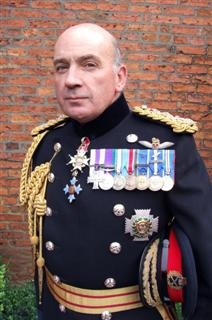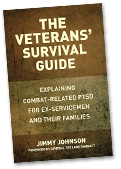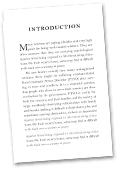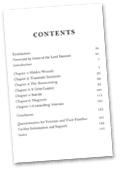 Warfare, fighting and violence are as old as history itself. Advances in medical science have revolutionised the way that physical battlefield injuries are treated but understanding and treating mental health injuries has lagged way behind. Even admitting that such injuries exist at all has only come about in the last century. Removing the stigma that surrounds those who need help is still an ongoing issue, and for those suffering from mental health injuries, the problem is very real, urgent and all-consuming. Undiagnosed and untreated, otherwise healthy people can descend from an apparently unremarkable life to a living hell of broken relationships, financial ruin, addiction, violence, prison and, tragically for some, suicide. There has to be a better way.
Warfare, fighting and violence are as old as history itself. Advances in medical science have revolutionised the way that physical battlefield injuries are treated but understanding and treating mental health injuries has lagged way behind. Even admitting that such injuries exist at all has only come about in the last century. Removing the stigma that surrounds those who need help is still an ongoing issue, and for those suffering from mental health injuries, the problem is very real, urgent and all-consuming. Undiagnosed and untreated, otherwise healthy people can descend from an apparently unremarkable life to a living hell of broken relationships, financial ruin, addiction, violence, prison and, tragically for some, suicide. There has to be a better way.
Every human being is unique. Therefore every mental health issue is almost certain to have its own particular characteristics and no cure is going to work in exactly the same way for two people. However, the experiences of others can be enormously helpful, as many military veterans in prison have already discovered from reading Jimmy Johnson’s story. Previously circulated through informal photocopied pages, the proper publication of the Veterans’ Survival Guide offers the prospect of many others benefitting by reading what Jimmy has been through. As the mental health professionals quite correctly say, one man’s cure may be another man’s poison, but there is no denying the benefit of shared experiences. That is what this book sets out to do.
I first met Jimmy Johnson in 2011 in a small room in the Category A wing of Her Majesty’s Prison Frankland where high-risk prisoners were held. Situated just outside the City of Durham, entering that prison was an almost surreal experience. I had first set foot there in December 1980 when my battalion, 1st Battalion The Green Howards, was tasked to run the prison during a strike by the Prison Officers Association (POA), which was in dispute with the Home Office. The governor-grade staff were working; the prison warders themselves were not. The Army did the rest. As a company commander I was responsible for everything that took place inside the prison, while others were responsible for external security and general administration. The prison was brand new – in fact it had not been fully completed when the Home Office decided to open it early to ease the problems caused by the POA strike. The motors to run the huge airlock gates had not been installed – three soldiers shoved the gates open and closed as required; many other locks had not been fitted either so soldiers stood at doors with padlock and chain. I did not expect to return thirty-one years later to visit an ex-Army double murderer. This book is Jimmy’s story.
By the time the Veterans’ Survival Guide is published Jimmy Johnson will be seventy, but in the early 1970s he was a young and successful Corporal in the Royal Tank Regiment. With the exception of the Irish Regiments, all the combat units of the British Army rotated through tours of duty in Northern Ireland – initially four months at a time and returning to the Province often within a year. Forty years on it is easy to forget the intensity of the violence during the so called ‘Troubles’. In 1972 alone, 102 British soldiers lost their lives fighting to keep Northern Ireland as an integral part of the United Kingdom. The intensity of what Jimmy Johnson went through in Northern Ireland in the 1970s is both different and similar to what other soldiers, sailors, airmen and marines have gone through in the Falklands, in the Balkans, in Iraq and Afghanistan in more recent decades. And like many of those servicemen, Jimmy was a dedicated soldier, a bold leader and courageous – he has the oak leaf of a Mention in Dispatches on his Northern Ireland General Service Medal to prove it. And yet Jimmy suffered mental illness that led to the murder of two men and he faces the prospect of perhaps never being released from prison. It did not have to be like this.
The responsibility of preventing others following Jimmy’s path into an open-ended prison sentence rests on many shoulders. The Ministry of Defence and the Armed Forces must become more accepting of the existence of mental health illness and continue to bear down on the stigma that still surrounds those who put their hands up for help. General Practitioners within the National Health Service must become more aware that patients who are military veterans may have seen, heard and experienced things not encountered in civilian life. The police and those administering the Criminal Justice System must be more watchful to pick out military veterans who come into their hands and try harder to understand their particular circumstances. Service charities should continue to expand their assistance, not only to treat those with post-traumatic stress disorder but also to offer early-intervention programmes for those with anxiety and depression. Jimmy had to wait until 2000 to be diagnosed with PTSD; he is still waiting for formal diagnosis by the Criminal Justice System. That is a tragedy that should never have occurred nor must do so again. When so many elements of our society have failed to recognise the circumstances that led him to develop PTSD, commit murder and end up in prison, there has to be a better way. The alternative, as Jimmy himself says:
‘If they don’t treat them for PTSD, it’s like releasing tigers into a school playground.’
Jimmy Johnson is the author of this book and his motivation for writing it is to prevent others from following the path that his life took. Jimmy stands to make no financial gain from this book. He would like to join me in thanking the Army Benevolent Fund, now The Soldiers’ Charity, Help for Heroes and Jim Davidson of Care after Combat for providing the funding for the publication of the Veterans’ Survival Guide. Lorne Forsyth of Elliott and Thompson has overseen the publication and Pippa Crane has edited the copy as necessary. Dr Walter Busuttil, the Medical Director of Combat Stress, has made very useful comments about the book and has given it his personal endorsement. I am also very grateful to Dr Vanessa Lewis, the Head of Psychological Well Being for Help for Heroes, who has made a series of most pertinent comments that have been incorporated into the final draft. The Help for Heroes ‘Hidden Wounds’ programme is designed to help those veterans with low-level anxiety and depression back to full mental health and prevent them from developing more serious problems which can lead to an encounter with the criminal justice system, as it did in Jimmy Johnson’s case.
It is intended that copies of this book will be placed in GP’s surgeries and police custody centres as well as being distributed privately. Some of the distribution will be part of Project Nova, which is a partnership delivery of services between Walking with the Wounded and the Regular Forces Employment Association and which aims to ensure that no veteran with mental health issues slips through the safety net provided by the integration of police custody centres, NHS Liaison and Diversion teams, the Probation Service, the Court Service and other statutory and charitable providers of support to veterans.
But first and last, this is Jimmy Johnson’s book and this is his story. What he has realised over the years and the help that he has given others through his Veterans in Prison network, has come about through his own personal experiences. Jimmy’s story and his advice are not template solutions for all who are suffering mental illness as a result of their military service. But the Veterans’ Survival Guide is Jimmy’s authentic account of his own experiences and opinions, which he willingly shares in the fervent hope of helping others tread a different path to the one that he trod.
Richard Dannatt
General the Lord Dannatt GCB CBE MC DL
Chief of the General Staff 2006–2009
House of Lords, January 2016



